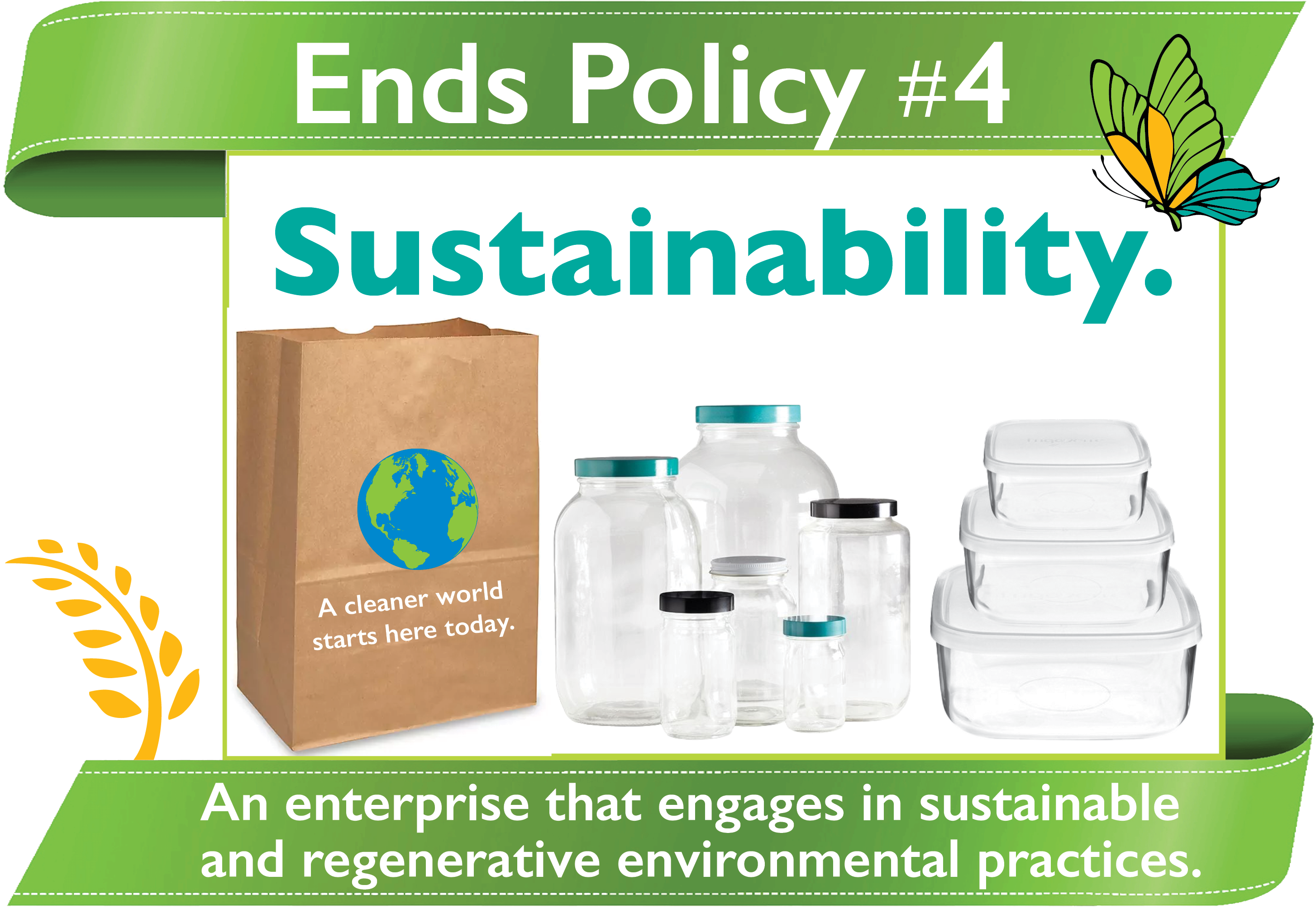News from the Sustainability Journey

By Sarah Brennan, Board Administrator/Sustainability Coordinator
It’s time for another update on what the Co-op has been up to on the sustainability front!
Let’s start with the fun part: You know how you get a nickel back at the register for any reusable container or bag you use? Well, in honor of Plastic Free July (and for the month of July only), we’re doubling that to ten cents per bag or container. Hooray!
The journey towards plastic-free continues. By the time you read this, we will have phased out plastic bags in the Bulk and Wellness departments. We’ll have cornstarch-based bags (the same ones we use in Produce), and cellophane bags for herbs/spices. The former can be composted in either a home or industrial setting, such as the Windham Solid Waste Management District facility. The cellophane bags are compostable in an industrial setting. Paper bags are also an option, of course—as well as any container you bring from home. You’ll see those same cellophane bags in the Wellness department, too.
We’ve started wrapping our many of our pre-made sandwiches in paper instead of placing them in plastic clamshells or wrapping them in plastic film.
We’re working hard to keep plastic film from the landfill. We’ve partnered with a few area businesses to take our bubble wrap and air pillows, and we are finishing up a plastic film collection pilot. Pallet wrap, case overwrap, cling wrap, bread bags, tortilla bags, the sleeves all our cups and packaging come in – we’ve been gathering and weighing it all. Next up: getting a baler on-site and having it hauled away, where it will be repurposed into “eco-friendly outdoor products.” Once that happens, we’ll think about opening up collection to customers as well.
And now, for the deep dive!
I reported in April that we’ve been investigating replacing the clear plastic clamshells we use in our Grab ‘n Go with a compostable alternative. I mentioned that the increased cost was one concern. We’ve gone down several rabbit holes lately in the course of our research, ranging from conversations with the company that makes our scale labels, to touring Windham Solid Waste’s industrial composting operations. That was fascinating! We are very lucky to have an industrial compost facility in our area. We observed the equipment that screens out contaminants from the compost. This reassured us that any non-compostable labels would be effectively screened out of the final product.
The clamshells we’re thinking about transitioning to are made of PLA, which stands for polylactic acid. It’s derived from vegetable starch such as corn, beets, or other crops. On the plus side, it would be great to break away from petroleum-derived plastic for numerous reasons. It’s very satisfying to think of contributing to a circular economy, where there is essentially no waste.
On the downside, however, PLA containers are only compostable in an industrial setting—one capable of generating the high temperatures necessary to break down the chemical bonds enough for the microbes to be able to do their magic.
For our many customers who are just traveling through the area, or who do not reside in one of the towns served by Windham Solid Waste, industrial composting isn’t going to be an option. Their clamshells would likely end up either in the landfill…where they would release methane, a greenhouse gas eighty times more harmful than carbon dioxide… or in the regular recycling stream…where they would contaminate the whole batch and jeopardize the recycling of regular #1 PET.
As if that’s not complicated enough, there’s the fact that even if we converted our Grab ‘n Go containers to PLA, we would still be carrying many items in #1 plastic clamshells. This includes berries and shrooms in our Produce Department, and everything in our Bulk Department. Why that is, and what we can do about it, is a story for another day. In the meantime, telling the difference between a compostable PLA container and one made of petroleum-derived #1 PET plastic is a challenge. There’s a recycling symbol on the bottom of the container, but guess what? Many of our Bulk products arrive at our store with ingredient labels on the bottom, obscuring the symbol.
So, the upshot for now is that we’re sticking with #1 plastic. Fortunately, our Green Team reminds me that the proper order of events is “reduce – reuse – recycle,” and we’ll be taking inspiration from that phrase in our next steps.
Want to learn more or get involved? Please share your ideas on a feedback form (available at Customer Service), or through any of the “contact us” links on our website, or by dropping me a line at [email protected].
About Producer of The Month

Shop Online

On Sale Now!

